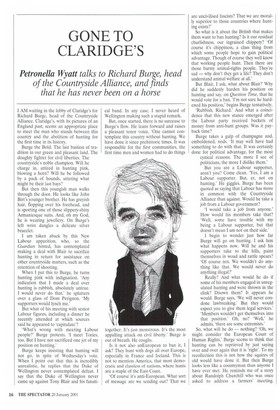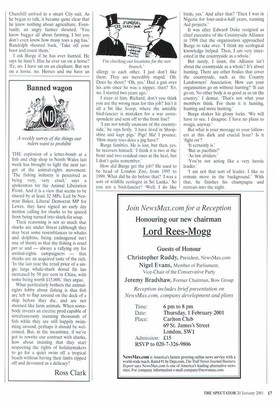GONE TO CLARIDGE'S
Petroneila Wyatt talks to Richard Burge, head
of the Countryside Alliance, and finds that he has never been on a horse
I AM waiting in the lobby of Claridge's for Richard Burge, head of the Countryside Alliance. Claridge's, with its pictures of an England past, seems an appropriate place to meet the man who stands between this country and the abolition of hunting for the first time in its history.
Burge the Bold. The last bastion of tradition in our green and pleasant land. The doughty fighter for civil liberties. The countryside's noble champion. Will he charge in, attired in hunting pink, blowing a horn? Will he be followed by a pack of hounds, uttering what might be their last bays?
But then this youngish man walks through the door. He looks like John Birt's younger brother. He has greyish hair. flopping over his forehead, and is sporting one of those slippery-shiny Armaniesque suits. And, oh my God, he is wearing jewellery. On Burge's left wrist dangles a delicate silver bracelet.
I am taken aback by this New Labour apparition, who, so the Guardian hinted, has contemplated making a deal with Blair to sacrifice hunting in return for assistance on other countryside matters, such as the retention of shooting.
When I put this to Burge, he turns hunting pink with indignation. 'Any indication that I made a deal over hunting is rubbish, absolutely untrue. I would never do that,' he splutters over a glass of Dom Perignon. 'My supporters would lynch me.'
But what of his meeting with senior Labour figures, including a dinner he recently attended at which sources said he appeared to 'capitulate'?
'What's wrong with meeting Labour people?' Burge protests. 'I meet Tories, too. But I have not sacrificed one jot of my position on hunting.'
Burge keeps insisting that hunting will not go, in spite of Wednesday's vote.
When I point out that this is incredibly unrealistic, he replies that the Duke of Wellington never contemplated defeat. I say that the Duke of Wellington never came up against Tony Blair and his fanati cal band. In any case, I never heard of Wellington making such a stupid remark.
But, once started, there is no surcease to Burge's flow. He leans forward and raises a pleasant tenor voice, 'One cannot contemplate this country without hunting. We have done it since prehistoric times. It was responsible for the first communities, the first time men and women had to do things together. It's just monstrous. It's the most appalling attack on civil liberty.' Burge is out of breath. He coughs.
Is it not also unEuropean to ban it, I ask? They hunt with dogs all over Europe, especially in France and Ireland. This is not to mention America, that most democratic and classless of nations, where hunts are a staple of the East Coast.
'Of course it's anti-European. What sort of message are we sending out? That we are uncivilised fascists? That we are morally superior to those countries where hunting exists?'
So what is it about the British that makes them want to ban hunting? Is it our residual churlishness, our ingrained chippery? 'Of course it's chippiness, a class thing from which some people hope to gain political advantage. Though of course they well know that working people hunt. Then there are those barmy animal-rights people. They're sad — why don't they get a life? They don't understand animal welfare at all.'
But Blair, I ask, what about Blair? Why did he suddenly harden his position on
hunting and say, on Question Time, that he would vote for a ban. 'I'm not sure he hardened his position,' begins Burge tentatively.
'Rubbish, Richard.' And what a coincidence that this new stance emerged after the Labour party received buckets of money from anti-hunt groups. Was it payback time?
Burge takes a gulp of champagne and, emboldened, nods. 'It may well have had
something to do with that. It was certainly done for political advantage, for the most
cynical reasons. The more I see of politicians, the more I dislike them.'
But you are a Labour supporter, aren't you? Come clean. 'Yes, I am a Labour supporter. But, er, not on hunting.' He giggles. Burge has been quoted as saying that Labour has more in common with the Countryside Alliance than against. Would he take a job from a Labour government?
'I would take a job from anyone.' How would his members take that?
'Well, some have trouble with my being a Labour supporter, but that doesn't mean I am not on their side.'
I begin to wonder just how far Burge will go on hunting. I ask him what happens now. Will he and his supporters take to the hills, paint themselves in woad and rattle spears?
'Of course not. We wouldn't do anything like that. We would never do anything illegal?'
Really? And what would he do if some of his members engaged in unreg ulated hunting and were thrown in the
clink? Disown them? It appears he would. Burge says, 'We will never con done lawbreaking.' But they would expect you to give them legal services.' `Members wouldn't get themselves into that position.' Oh, no? 'Well,' he admits, `there are some extremists.'
So. what will he do — nothing? 'Oh, we might consider the European Court of Human Rights.' Burge seems to think that
hunting can be reprieved by just saying over and over again that it is 'right'. To my
recollection this is not how the squires of old would have done it. But then Burge looks less like a countryman than anyone I have ever met. He reminds me of a story about Randolph Churchill who was once asked to address a farmers' meeting. Churchill arrived in a smart City suit. As he began to talk, it became quite clear that he knew nothing about agriculture. Eventually, an angry farmer shouted, 'You know bugger all about farming. I bet you don't even know how many toes a pig has.' Randolph shouted back. `Take off your boot and count them.'
I ask Burge if he has ever hunted. He says he hasn't. Has he ever sat on a horse? 'Er. no. I have sat on an elephant. But not on a horse. no. Horses and me have an































































 Previous page
Previous page